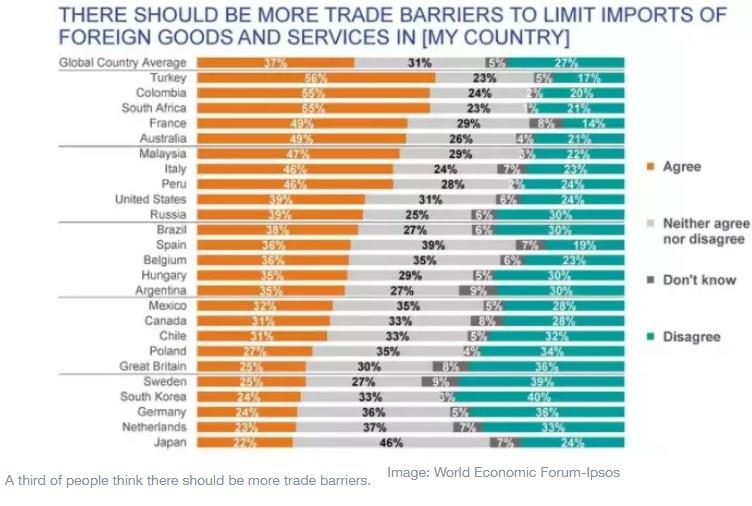by Borge Brende and Jose Vinals*
Trade policy needs an urgent update.
The COVID-19 pandemic has deepened inequalities in and across countries. Recent record heatwaves remind us that we must address the climate crisis before it’s too late. And digitalization is providing new ways of delivering goods and services while raising new questions around its risks and regulation.
In this context, it is critical that we re-evaluate where trade and investment have helped - and where they have hindered. We need to go back to the basics: what is trade for? And how can it provide better outcomes for people and planet?
Evolution of trade policy
Trade relations have always been a means to an end. But that end has shifted over the past century as global attitudes towards trade and what it must deliver have evolved.
In the 1940s, the General Agreement on Tariffs and Trade enshrined growth as the key objective of international trade relations, suggesting full employment and rising standards of living would follow. By the time the World Trade Organization formed in 1995, the trade system was also expected to address sustainable development and ensure that developing countries secured a share in trade growth.
Today, the trading system must adapt again to address additional concerns of global resiliency, sustainability and inclusivity. The G20 Leaders Declaration has outlined key aspects of the COVID-19 recovery, namely, economic growth and job creation, health, digitalization, sustainability and inclusion. Trade has an important role to play in delivering each of these dimensions.
According to a recent Ipsos-World Economic Forum survey, 75% of the global public supports expanding trade, but only half said they thought globalization was good for their country, a drop of 10 percentage points since 2019. This ambiguity reveals belief in the potential of trade for improving lives but deep unease over its current directions. Cooperation is needed to guard against a race to the bottom or harmful shocks while harnessing the benefits of trade.

Potential of trade reform
So, how can world leaders ensure trade policies realize their potential for growing economies, reducing poverty and empowering people worldwide?
First, COVID-19 made it clear that trade is critical in the preparedness and response to health crises. Trade and investment are crucial in the research, development, manufacturing and distribution of personal protection equipment, diagnostics, vaccines and therapeutics. Governments should consider lowering tariff and administrative barriers, facilitating investments, improving supply chain transparency and refraining from export restraints.
Second, digitalization has resulted in meaningful benefits to people’s lives. During lockdowns, digital trade in services and e-commerce kept large portions of economies running. Creating and investing in an accessible and interoperable global digital ecosystem is a crucial component of recovery and future economic resilience.
Third, reducing the complexity of international commerce will provide more opportunities for small businesses to spread innovation and boost employment, stemming the decline in foreign investment, which threatens development gains. Governments must work towards streamlined, transparent and predictable investment procedures and provide technical assistance and support to developing countries and help them gain access to international trade.
Fourth, greener global production and consumption depends on policies that encourage environmental innovation and defuse blame-shifting as an excuse for inaction. Countries should consider reducing barriers to and promoting trade in goods and services that support the sustainable development goals along with phasing out fossil fuel subsidies, aligning on border carbon measures and facilitating green investment.
And finally, trade benefits must reach stakeholders that have been side-lined for too long, including the economically disadvantaged, women, youth, ethnic and religious minorities and Indigenous people. The interests of disadvantaged groups must be considered in the development, implementation and monitoring of trade rules, as well as in domestic policies that might affect their ability to participate in trade, including labour, property, contract and other laws.
Trade for Tomorrow
Some global leaders and businesses are already signalling a change in approach. For example, US Trade Representative Katherine Tai has emphasized the worker-centric trade agenda of the Biden administration and argued that trade policies must consider their impact on workers, women and the environment. An increasing number of countries are protecting the rights of Indigenous peoples and including gender provisions in their trade agreements. Businesses are making ambitious commitments toward climate action, women’s economic empowerment and racial equity.
More than 20 leaders from some of the world’s biggest companies have joined a multi-stakeholder call on governments to refrain from protectionism and promote trade policies that are efficient, transparent and leave no one behind.
The World Trade Organization’s long-delayed ministerial meeting in December offers an opportunity to re-evaluate the role of trade in today’s world and deliver on meaningful reforms. We cannot let disagreement paralyze us or cause us to retreat from the potential of progress. Together, we can set a path for the sustainable, inclusive trade for tomorrow.
*President, World Economic Forum and Group Chairman, Standard Chartered Bank
**first published in: www.weforum.org




 By: N. Peter Kramer
By: N. Peter Kramer

